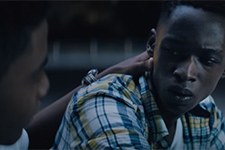Moonlight
|  Barry Jenkins’s coming-of-age drama Moonlight is told in three distinct chapters, each of which is titled after the shifting names by which the film’s complex young African-American protagonist is known. The first chapter, “Little,” depicts him as a troubled, insecure, and almost pathologically shy 7-year-old (played by Alex Hibbert); the second chapter, “Chiron,” depicts him as a gangly, awkward 16-year-old (played by Ashton Sanders) struggling with loneliness, bullying, and his emergent gay sexuality; and, finally, the third chapter, “Black,” depicts him as a hardened, musclebound twentysomething (played by Trevante Rhodes) who has turned to a life of dealing drugs to survive, but is still that insecure, awkward child inside. The cumulative effect of this self-conscious triptych structure is to see Chiron’s life as both flow and segmentation, which forces us to determine for ourselves the content of the missing 9 to 10 years between each chapter, a gambit that we do almost unconsciously in most films that take place over long periods of time, but here feels self-consciously pronounced. This is both the film’s strength and its weakness, as the characterological leap between chapters two and three feels much more forced than the leap between one and two, resulting in a film that is dramatically effective, but uneven. Jenkins, who also scripted from a story by Tarell Alvin McCraney, relies heavily on quite a few familiar clichés, but mostly transcends them by emphasizing their universality, which makes Moonlight more than a black film or an urban film or a gay film. He also makes a few daring choices, such as beginning the film not with Chiron, but with Juan (Mahershala Ali), a dealer on the streets of Miami who discovers the young boy hiding in an abandoned apartment. Eschewing expectations, Juan takes the boy in and eventually gets him to confide in him and his girlfriend, Teresa (Janelle Monáe), who fulfills the caring maternal presence that his biological mother, Paula (Naomie Harris), who is descending quickly into drug abuse and desperation, does not. There is a striking moment when Little, who has been almost completely silent out of both fear and self-preservation, boldly asks Juan what a “faggot” is, to which Juan replies quite rightly, “a word that people use to make gays feel bad about themselves.” There is something inherently refreshing in seeing a character who, in most narratives of this sort, would by a homophobic monster conveying in such stark, simple, and honest terms the meaning of a terrible word. Little is clearly already feeling his sexual difference, which comes to dominate the film’s middle chapter, as the teenage Chiron endures increasingly horrific bullying from a fellow schoolmate named Terrel (Patrick Decile) while finding emotional solace with Kevin (Jharrel Jerome), another schoolmate who uses brash misogynistic talk and sexual braggadocio to hide the fact that he, like Chiron, is a sensitive soul grappling with sexual longing that he can’t reveal. Their sexual encounter on a beach is Chiron’s true awakening, but it is short-lived and ultimately leads to a betrayal of the sort that sends him over the edge, resulting in him becoming the hard-bodied Black (the nickname that was ironically given to him by Kevin as a term of endearment). With a mouth full of gold and a head full of scars, Black looks and feels entirely distinct from both Little and Chiron, which makes theoretical sense, but feels like a narrative lurch. In other words, the transformation from Chiron to Black, while clearly intimated in the last, violent, and tragic moments of the middle chapter, isn’t really convincing, at least not at first. Nor is the narrative gambit of bringing Kevin, now played by Andre Holland, back into his life via an unexpected phone call in the middle of the night. This leads to a reunion in an old-fashioned diner that allows Black, who is otherwise too busy being tough and hard, to reveal that his emotional core is still intact, just hidden behind all those gold chains and muscle. There is poignancy in recognizing that the child and awkward teen he had been have not been completely obliterated by the agonies of life, but it is never fully convincing, which renders the film’s final third dramatically necessary, but never quite as moving as it is meant to be. Copyright © 2016 James Kendrick Thoughts? E-mail James Kendrick All images copyright © A24 |
Overall Rating: 

 (3)
(3)


